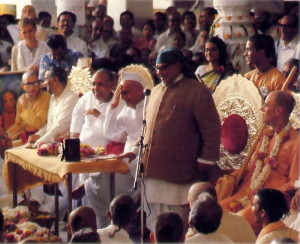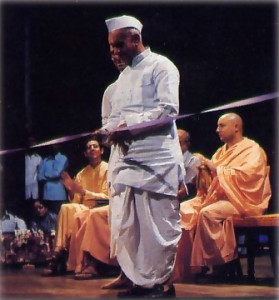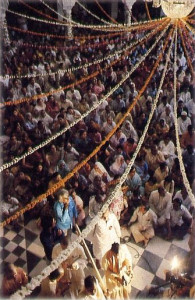A look at the worldwide activities of the
International Society for Krishna Consciousness (ISKCON)
New Cultural Center Opens in Bombay

In January some of India’s foremost political and cultural figures took part in the inaugural ceremonies for ISKCON’s new Sri Sri Radha-Rasavihariji Temple and Vedic Cultural Center in Bombay.
Two provincial chief executives and a member of the Indian Cabinet delivered speeches to an audience that included hundreds of Bombay’s leading citizens, representatives of the international news media, and guests from around the world. The officials stressed the center’s future role in spreading the ideals of India’s ancient Vedic culture worldwide.
Sri Prabhudas Patwari, governor of the Tamil Nadu province, said he hopes to help spread the teachings of Krsna “through many languages, to all people in all the nooks and corners of the world. In this way … we may create an international climate of peace and happiness. . . .”

Mr. Vasantrao Patil, the chief minister of Maharashtra (the province in which Bombay is located), said that all people should follow Lord Krsna’s advice in the Bhagavad-gita for eternal peace and happiness.
Indian Health Minister Raj Narain remarked, “It is amazing to me that now Westerners have taken to the Indian culture just when we are losing it.” Yet at the opening of the Bombay center’s Bhaktivedanta Auditorium, well-known Indian classical dancers and dramatists proved that Krsna conscious culture is still going strong in its homeland. After an opening address by Sri D.T. Rupavate (the cultural minister of Maharashtra), Srimati Vyjayanthimala Bali, one of India’s foremost classical dancers, delighted the audience with dances based on the pastimes of Krsna. Vocalist Sri Hari Om Sharan presented a special song he had composed in honor of His Divine Grace A.C. Bhaktivedanta Swami Prabhupada, as well as traditional Indian songs in praise of Krsna. Then Arvind Parikh, who ranks high among India’s masters of the sitar, played morning ragas.
An estimated twenty thousand visitors attended the two days of ceremonies.
ISKCON Food Relief in Action

Last November a cyclone devastated coastal areas of India’s Andhra province. It killed tens of thousands of villagers and left millions homeless and hungry. In the cyclone’s wake, a team of ISKCON Food Relief workers took part in emergency food distribution.
The food relief team, based at ISKCON’s Hyderabad farm community, is supported by monthly contributions of funds from ISKCON centers worldwide. Soon after the cyclone struck, leaders of the team contacted the agriculture minister of Andhra Pradesh and quickly received clearance to enter the disaster area.
A convoy of vehicles carrying tons of food and cooking equipment departed at once for the town of Guntur, in the coastal lowlands. There, at a jute mill, the team set up an emergency food preparation center and began their work. For the next few days they stayed in the disaster area and fed the hungry.
The ISKCON Food Relief program had a spiritual focus that set it apart from similar efforts by other international agencies. “Come and take Krsna’s prasada!” the team members shouted as they entered demolished villages. Prasada (“mercy”) is the name for food offered to Krsna, God.
In the Bhagavad-gita, India’s most widely-read scripture, Krsna states that by eating prasada, people are released from the bad effects of their karma. According to the law of karma, miseries result from past misdeeds, including those committed in previous lifetimes. Unfavorable karmic reactions may occur in the form of war, disease, famine, or natural disasters.
ISKCON, Red Cross Supply Food, Shelter in Blizzard
During the worst blizzard in Cleveland’s history, the local branch of Govinda’s restaurant became an emergency kitchen. While the late-January storm was still raging, ISKCON leaders conferred with Red Cross officials at the local disaster headquarters and learned that most of the Red Cross manpower was already tied up. Workers were sorely needed to prepare hot meals.
So ISKCON volunteers quickly converted Govinda’s restaurant in downtown Cleveland into a Red Cross shelter and started giving out piping hot prasada. They also fed people at the main Red Cross shelter in city hall, at the Greyhound bus station shelter, and at a senior citizens home in East Cleveland. When a radio operator at a CB base station got a call from a group of truckers stranded on an outlying highway, she dispatched a driver with hot prasada and Copies Of BACK TO GODHEAD. And so it went, on through the night.
The next morning, Red Cross disaster chief Bill Lentz thanked Arjita dasa, the president of ISKCON’s Cleveland center, and he asked the devotees to stay on the ready for future emergencies. “One more thing,” he added—”could you give us all a hot breakfast?”
Thank You, Mr. Carter
During the 1976 election campaign, candidate Jimmy Carter received some literature from an ISKCON devotee and wrote him a polite thank-you note. “We have received your gift, Bhagavad-gita As It Is [by His Divine Grace A.C. Bhaktivedanta Swami Prabhupada] and two copies Of BACK TO GODHEAD. Rosalyn and I appreciate your thoughtfulness.”
But that wasn’t all. When President Carter arrived in India for a state visit this past January, he was carrying the Gita with him. He had studied the book in preparation for his trip, and while in India he discussed it with Prime Minister Desai.
Mr. Carter told Mr. Desai, “I woke up early this morning and read the Bhagavad-gita for a couple of hours. It is a very beautiful work, very exciting too. It was quite interesting in that it demonstrated the unimportance of the length of physical life…. I am going to do some more study.”
In the Gita, Lord Krsna stresses the importance of the soul over the body. At another point during his visit President Carter also remarked, “The most important bond between India and the United States is our emphasis on the questions and commitments of the spirit.”

Leave a Reply